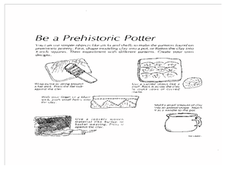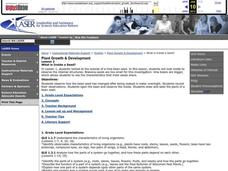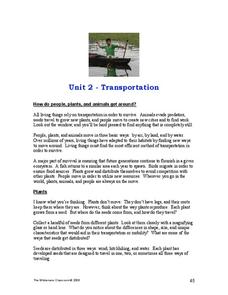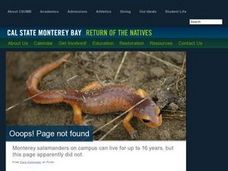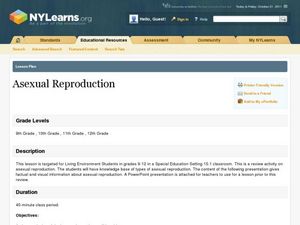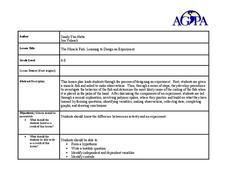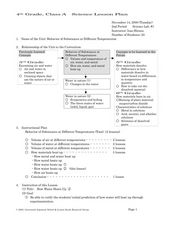Curated OER
The Global Impact of Insect Borne Diseases & Agriculture
Students study the global impact of insect borne diseases, the appropriate use of pesticides, and the concept of human interrelations on a world wide scale. They examine how to safely apply a pesticide, according to the label.
Curated OER
Understanding Life System: Growth and Changes in Plants
Third graders research ways in which plants are essential to humans. In this Global Peace lesson, 3rd graders participate in tasks, such as creating a propaganda poster. Students may watch the film, The Lorax, as a closing activity.
Curated OER
What's Up at the Rim?
Pupils are sent on a scavenger hunt to find as many plants as they can in nature.
Curated OER
Everything in Its Place: Science Classification
Students investigate the system of classification for living things through the sixteen lessons of this unit. The five kingdoms of monerans, protists, fungi, plants, and animals form the basis of several experiments as the similarities...
Curated OER
Monocots vs. Dicots
Students examine the differences in nonvascular and vascular plants. They compare the differences between gymnosperm and angiosperms. Students compare the differences between moocots and dicots. They view a powerpoint presentation on...
Curated OER
Archaeology and Prehistoric Native Americans
Students study the terms paleontology and archaeology and examine how they can help us learn about prehistoric Native Iowans. In this archaeology lesson students discuss these terms and view a video on Native Americans.
Curated OER
What is Inside a Seed?
Middle schoolers observe how the bean seed has changed after being soaked in water overnight and record their observations. They open the bean and observe the inside. Finally, students draw and label the parts of a bean seed and write...
Curated OER
Algae--Where does it Live?
Students discover algae. In this science lesson plan, students examine what green algae is and where it grows. Students test the growth of algae in four different types of water: lake water, well water, distilled water and tap water
Curated OER
Transportation
Students read about various modes of transportation for people, plants, and animals. In this transportation lesson, students read information about the transportation modes for people plants, and animals using water and land. Students...
Curated OER
Examining Seeds
Students explore botany by conducting an investigation in class. In this seeds lesson, students utilize lima bean seeds and magnifying glasses to examine the different parts of a seed after it has been dissected. Students compare...
Curated OER
Invasive Species
Learners study exotic and native species, and examine how exotic species can impact native ones. They study how the mute swan effects native species.
Curated OER
Life Cycles
Using computers, Students work in small groups and progress through the roles of Explorer, Researcher, Designer, and Evaluator as they study the life cycle of plants, insects, butterflies and frogs.
Curated OER
Population Explosion Relay
Learners study the concepts of seed dispersal, germination rate, exponential population growth, and predation by engaging in a bean 'weeds vs. natives' relay race. They illustrate how weeds out-compete other plants for space by crowding...
Curated OER
Life Science Review for Grade 4
In this life science review for grade 4 worksheet, 4th graders answer 25 multiple choice questions in standardized test format about life science.
Curated OER
Asexual Reproduction
Sixth graders investigate how asexual reproduction produces single-parent offspring. They use plants and yeast to demonstrate vegetative propagation and budding in a laboratory. Students draw five different types of asexual reproduction.
Curated OER
Bird Beak Adaptation Lab
Students investigate bird beaks to determine which physical adaptations are necessary based on the types of food the birds eat. They participate in a lab by visiting multiple stations to determine which beaks are most efficient, and...
Curated OER
The Miracle Fish: Learning to Design an Experiment
Students develop procedures to explore the behavior of fish. In this scientific experiment lesson students from a hypothesis, write a question, identify different variables and controls in their experiment.
Curated OER
What's That Brown Fuzzy Stuff on My Plum?
Students use Koch's Postulates to determine that a specific organism is the root cause of a specific disease and identify what Koch's Postulates are within a protocol. They describe symptoms and signs of diseased fruit and isolate fungal...
Curated OER
The Wonderful Pigs of Jillian Jiggs
First graders compare fictional and real pigs. In this pig comparison instructional activity, 1st graders read a fiction text then a non-fiction text on pigs. Students complete a K-W-L chart and fill out a Venn Diagram.
Curated OER
Plants and Animals of Great Bay Animals and Plants of the Estuary
Students participate in a webquest about the plants and animals that inhabit an estuary. They role play as environmentalists researching this habitat and present the results of their research in a creative way.
Curated OER
Lake and Pond Study
Students examine the habitat and community structure of a pond that could support Ospreys through games and worksheets. They then go on a field trip to a pond to evaluate the suitability of the pond as an Osprey habitat.
Curated OER
Our Special Planet Earth
Students explore what is special about our planet. They explore the various climates that are found on the planet Earth. Students create an advertisement to convince people why their favorite environment would be the best place to visit.
Curated OER
Behavior Of Substances At Different Temperatures
Fourth graders are involved in a lab experience to look at the concept of heating up various materials to see how they react to an increase in temperature. They make observations and record them in a lab journal. Then students discuss...
Curated OER
How Water Heats Up
Fourth graders conduct experiments heating water. In this inquiry-based early chemistry lesson plan, 4th graders use the materials given to experiment with the process of heating water. Students draw conclusions based upon their findings...







